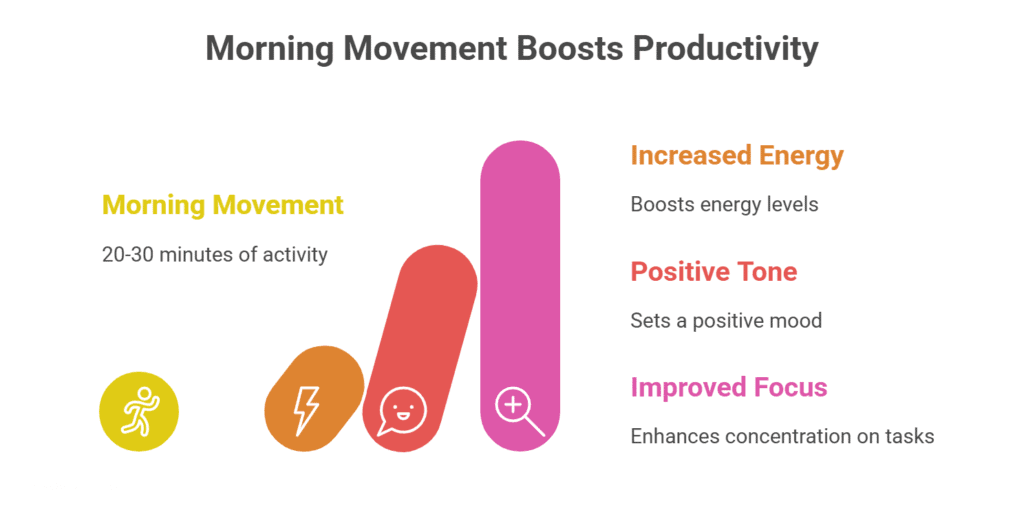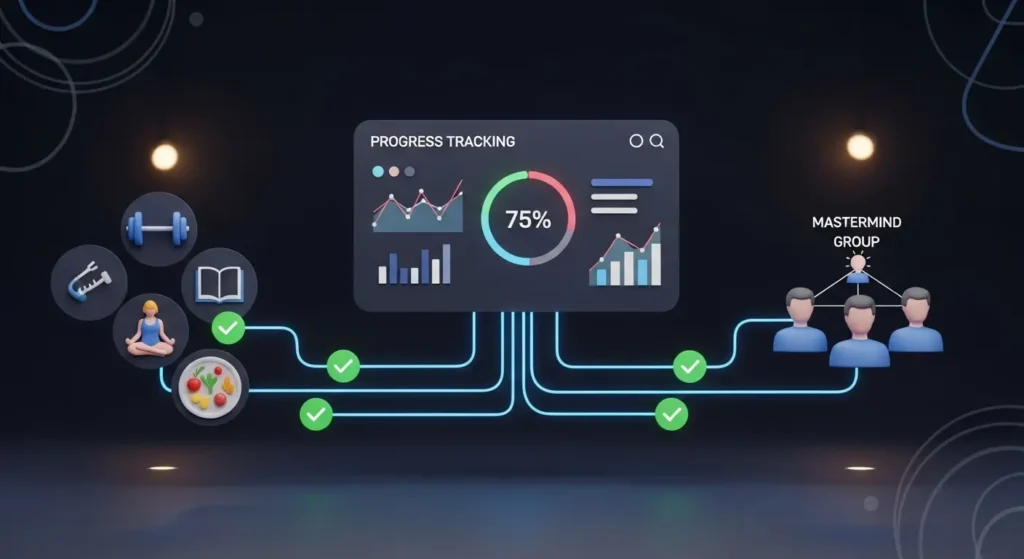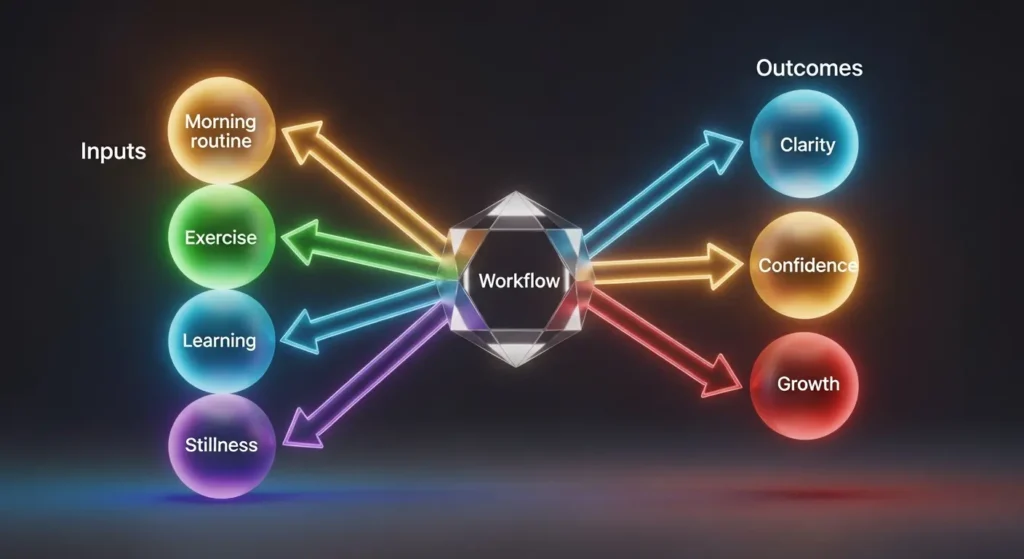You’re working 70-hour weeks. Revenue is stuck. Your energy is drained by 2 PM. You’ve optimized your sales funnel, refined your marketing, and streamlined operations, yet something still isn’t clicking. Here’s what most entrepreneurs miss: the bottleneck isn’t in your business systems. It’s in your personal systems.
Key Takeaway:
- Personal development habits are the highest-leverage investment for entrepreneurs and coaches — 79% of top performers prioritize self-mastery over pure business tactics because better habits create clearer decisions, sustained energy, and scalable growth without burnout. [1]
- Focus on just 3–5 keystone habits using the 80/20 rule: a deliberate morning routine (15–30 min of clarity work), daily strategic learning (30 min of high-value input), consistent physical movement, and energy management rituals — these compound faster than any business hack. [1]
- Make habits stick permanently with habit stacking, the 15-minute rule, environment design, tracking, accountability partners or coaching, and the “never miss twice” rule — while tying every habit to a new identity (“I am someone who…”). [2]
- Start with ONE keystone habit for the next 30–90 days; the ripple effect will upgrade your energy, focus, confidence, revenue, and resilience faster than grinding harder on marketing or sales alone. [2]
Bottom Line: If you want sustainable business growth without constant hustle and burnout, master a handful of personal development habits first — they are the ultimate force multiplier.
- Source: Unleash Your Power – Personal Development Habits That Scale Your Business
- Source: “How to Make Habits Stick” and FAQ sections
The daily habits you build or neglect create a ripple effect that touches every decision, every client interaction, and every growth opportunity. Research shows that 79% of successful entrepreneurs rely on personal development and habits as their primary success factor, ahead of technology, partners, or communities. Yet most business owners treat personal development like an optional luxury instead of the foundation for sustainable growth.
I’ve walked this path. Years ago, I struggled with confidence, clarity, and the constant feeling of being stuck. It wasn’t until I transformed my own daily habits, anchoring consistent practices that supported my energy, mindset, and focus, that everything shifted. Your transformation doesn’t require overhauling your entire life. It requires optimizing the fundamentals.
Let’s break down exactly which personal development habits create measurable business results and how to implement them without adding more stress to your plate.
The Research-Backed Connection Between Personal Habits and Business Performance
Think of your daily habits as compound interest for your business. A morning routine that sharpens your decision-making doesn’t just improve one day; it elevates thousands of decisions over months and years. Studies of self-made millionaires reveal that 88% dedicate at least 30 minutes daily to education and self-improvement, while 76% engage in 30+ minutes of aerobic exercise. These aren’t coincidental lifestyle choices; they’re strategic investments in cognitive performance and sustained energy.

Here’s the truth most entrepreneurs discover too late: fixing business problems while neglecting personal systems is like upgrading your car’s engine while running on empty fuel. You might have the best strategy, the most innovative product, or the sharpest team, but if your personal operating system is running on burnout, poor sleep, and reactive decision-making, you’re capping your potential.
The personal development market has grown to a staggering $41.2 billion in 2023, forecasted to reach $81.6 billion by 2032. Why? Because high performers recognize that investing in themselves isn’t self-indulgent, it’s the highest-ROI decision they can make. Your business can only scale as far as you can lead it, and leadership capacity is built through intentional daily practices.
When you establish the right personal development habits, three things happen simultaneously: your decision-making sharpens because you’re operating from clarity instead of chaos, your energy sustains throughout the day instead of crashing, and your ability to handle pressure multiplies. This isn’t about adding more to your to-do list. It’s about building a growth-oriented mindset that transforms how you approach every challenge.
What Are The Most Effective Personal Development Habits For Entrepreneurs?
The most effective habits combine morning rituals for mental clarity, continuous learning for market relevance, strategic energy management to prevent burnout, and consistent goal-setting aligned with your bigger vision. Let’s be specific about what actually works.
Start with the 80/20 rule applied to your personal development. Not all habits deliver equal results. Organizational habits of successful business leaders show that focusing on the 20% of efforts that generate 80% of results is how they scale efficiently. For entrepreneurs, this means prioritizing habits that directly impact your three core assets: mental clarity, physical energy, and strategic thinking capacity.
Morning routines create the foundation. But forget the Instagram-perfect, two-hour rituals. High performers in their 40s and 50s consistently practice one crucial principle: they start with intention, not input. That means claiming 15-30 minutes before checking email or social media to set the day’s direction. This could be meditation, journaling, visualization, or simply sitting with your coffee and reviewing your top three priorities. The practice matters less than the principle that you control your morning before external demands control you.
Continuous learning separates those who adapt from those who become obsolete. If you read just 150 pages per month, roughly five pages daily, you’ll complete 12 books yearly, placing you in the top 5% of society. But here’s the key: curate content that directly solves your current business challenges. Reading for reading’s sake doesn’t move the needle. Strategic learning that addresses your specific growth stage does.
Habit stacking works better than willpower for busy entrepreneurs. Instead of trying to force new behaviors through sheer determination, attach them to existing routines. After you pour your morning coffee, take five minutes to review your goals. After you close your laptop at day’s end, spend three minutes journaling what worked and what didn’t. These micro-habits compound into massive shifts over months.
The role of physical health in business performance cannot be overstated. Your brain is an organ that requires proper fuel, movement, and rest to function optimally. When you neglect your body, you’re quite literally limiting your cognitive capacity to solve problems, make strategic decisions, and lead your team. This isn’t wellness fluff, it’s neuroscience.
The Burnout Prevention Framework: 4 Non-Negotiable Habits
Scaling without burning out requires a framework that protects your most valuable business asset: you. These four habits aren’t optional extras; they’re the infrastructure that allows sustainable high performance.
Energy Management Over Time Management
You’ve probably mastered time management. You block your calendar, batch tasks, and optimize your schedule. But here’s what changes everything: managing energy, not just time. Working longer doesn’t equal working better; in fact, it often destroys the quality of your output.

The science backs this up. Research on self-made millionaires found that 76% dedicate time to regular aerobic exercise, and many report that morning movement doubles their productivity. Successful leaders have documented that even 20-30 minutes of morning exercise, whether it’s a brisk walk, yoga, or gym time, creates cognitive benefits that last throughout the day.
Movement gets your blood flowing, clears mental fog, and triggers the release of neurotransmitters that enhance focus and mood. The practical application for entrepreneurs: protect your morning movement ritual as fiercely as you protect client meetings. This isn’t about getting a six-pack; it’s about maintaining the mental sharpness that drives million-dollar decisions.
Here’s what this means for you: if you’re hitting an afternoon slump where your decision-making suffers, the solution isn’t another coffee. It’s building sustainable energy management practices that prevent the crash in the first place.
Strategic Learning Systems
In a world where market conditions shift monthly, continuous learning isn’t optional; it’s survival. The entrepreneurs who thrive aren’t necessarily the smartest in the room; they’re the fastest learners who adapt their strategies as conditions change.
Here’s the data: 88% of wealthy individuals spend 30 minutes or more each day on education or self-improvement. They’re not reading for entertainment; they’re consuming content that sharpens their competitive edge. This could be industry reports, biographies of successful founders, frameworks for scaling operations, or psychological principles that improve leadership.
But the real power comes from implementation, not just consumption. After reading about a new strategy, ask yourself: “What’s one way I can test this concept in my business this week?” Turn information into experimentation. That’s where knowledge becomes ROI.
The compound effect is staggering. Dedicate 30 minutes daily to strategic learning, and over a year, you’ll have invested 182 hours into upgrading your thinking. That’s equivalent to 4.5 weeks of full-time education while running your business. This is how you stay ahead of competitors who are too busy “grinding” to invest in growth.
Clarity Through Stillness
The most counterintuitive habit for high-performing entrepreneurs? Doing nothing. In a culture that glorifies hustle, taking time for stillness feels like falling behind. It’s actually the opposite.
High performers in their 40s and 50s, people who’ve built and scaled successful ventures, prioritize morning stillness. This could be meditation, breathwork, prayer, or simply sitting in silence with a warm drink. The format doesn’t matter. The principle does: you give your mind space to process, integrate, and align before the chaos begins.
Many entrepreneurs wake up and immediately reach for their phones, inviting hundreds of voices into their headspace before they’ve clarified their own thoughts. That’s like starting a race with your shoelaces tied together. Structured routines are proven to reduce burnout risk by creating predictable anchors in an unpredictable business landscape.
Try this: dedicate just 15 minutes each morning to stillness. Sit quietly, focus on your breath, and ask yourself: “What are the top three priorities that will move my business forward today?” This simple practice creates clarity that prevents you from spending eight hours being busy instead of productive. Apply NLP techniques for personal transformation, like anchoring, to make this habit automatic. Associate a specific physical gesture with entering this state of clarity so you can access it instantly when needed.
Accountability Architecture
Willpower is overrated. Successful entrepreneurs don’t rely on motivation; they build systems that make the right habits easier than the wrong ones. This is accountability architecture: structuring your environment, relationships, and routines so that growth becomes the path of least resistance.

This starts with external accountability. Join a mastermind group where peers expect you to show up and report progress. Work with a coach who holds you to commitments. Share your goals with someone who will ask tough questions when you drift off course. The data on self-made millionaires shows that building a network of motivated, goal-oriented individuals directly correlates with success rates.
But accountability also means tracking progress with simple systems. Use a habit tracker app, a journal, or even a wall calendar where you mark each day you complete your core habits. The visual feedback creates momentum. Missing one day doesn’t derail you but seeing a streak of 30 days builds identity. You stop being someone “trying to exercise more” and become someone who exercises. That identity shift makes the habit sustainable.
Proven goal-achievement strategies show that people who write down their goals and review them regularly are significantly more likely to achieve them than those who keep goals vague and internal. Create a weekly review ritual where you assess what’s working, what’s not, and what needs adjustment. This isn’t bureaucracy; it’s strategic recalibration that prevents months of wasted effort.
How Do You Actually Implement Habits That Stick?
Successful habit implementation requires starting with one keystone habit, using habit stacking to build momentum, creating environmental cues that make the habit easier than not doing it, and tracking progress with simple systems that celebrate small wins.
Let’s address the elephant in the room: you’ve probably tried building better habits before and failed. Most people have. The reason isn’t a lack of willpower; it’s a misunderstanding of how habit formation actually works. Proven habit formation methodology shows that emotional response sparks change, not intellectual agreement.

Start with the 15-minute rule to break through procrastination. When you’re resisting a task, whether it’s exercise, strategic planning, or prospecting, commit to just 15 minutes. Set a timer. Tell yourself you can stop after 15 minutes if you want. Here’s what happens: the hardest part of any habit is starting. Once you’re in motion, continuing becomes easier than stopping. You’ll often find that 15 minutes turns into 30, then 45. But even if it doesn’t, you’ve still built the neural pathway that makes starting easier tomorrow.
The 21-day habit myth needs to die. Research shows that habit formation timelines vary wildly depending on the complexity of the behavior and individual factors. Simple habits might stick in three weeks. Complex behavioral changes can take three months or more. Stop beating yourself up for not being “disciplined enough” when the timeline was unrealistic from the start. Focus on consistency over perfection.
Identity plays a crucial role in habit sustainability. Instead of saying “I want to exercise more,” shift to “I am someone who values my health and moves my body daily.” The subtle reframe changes everything. You’re not forcing yourself to do something foreign; you’re expressing your identity through action. This is where stress management techniques that work integrate beautifully with habit formation, because reducing stress makes maintaining new behaviors dramatically easier.
Use NLP anchoring techniques for habit reinforcement. Choose a specific physical gesture, touching your thumb and forefinger together, taking three deep breaths, standing in a power pose and consistently pair it with your desired state or behavior. After enough repetitions, the gesture alone triggers the state. This becomes a powerful tool for accessing focus, confidence, or calm on demand.
Recovery protocols matter more than most people realize. When habits break and they will, because you’re human, you need a plan for getting back on track without spiraling into “I’ve failed, so I’ll just quit.” The protocol is simple: never miss twice in a row. One day off is life. Two days off is the beginning of a pattern. Three days off means you’re back at square one. When you miss once, make the next day non-negotiable.
From Personal Habits to Business Results: The Translation Map
Let’s connect the dots between personal practices and business outcomes with concrete examples of how these habits translate into measurable results.

Morning Routines → Better Decision-Making
Early risers gain three or more hours of focused time before the world demands their attention. This isn’t about waking at 4 AM because some productivity guru says so; it’s about claiming uninterrupted time when your cognitive capacity is highest. During these morning hours, your prefrontal cortex functions optimally, which means better strategic thinking, clearer prioritization, and more rational decisions.
I’ve seen this transformation in my own journey and with countless clients. One entrepreneur I worked with, similar to Darren, felt blocked from the abundance he wanted stuck despite a good income, unable to break through to the next level. When we identified his limiting beliefs and rebuilt his morning routine to include goal review and visualization, radical shifts followed. His thinking changed. His behaviors changed. His business results changed. The structured morning created the mental space for breakthrough insights that had been buried under daily chaos.
Health Habits → Sustained Performance
Energy management prevents the feast-or-famine cycle that plagues entrepreneurs. You know the pattern: intense work sprint, complete exhaustion, recover for a few days, repeat. This roller coaster destroys consistency, which destroys results.
When you establish non-negotiable health habits, regular exercise, proper nutrition and adequate sleep, you build a foundation for sustained high performance. Consider Mike, who struggled with anxiety, self-doubt, and career stagnation. Through coaching and NLP techniques, he addressed the root causes and built daily practices that eliminated the mental noise. The result? Anxiety vanished, confidence surged, and his career trajectory transformed. He now communicates with authority and makes decisions without second-guessing himself into paralysis.
This is the connection most entrepreneurs miss: personal wellness isn’t separate from business performance. Your body and brain are the tools you use to build everything else. Neglect the tools, and everything you build becomes harder.
Learning Habits → Market Edge
Continuous skill development keeps you ahead of industry changes that blindside your competitors. The market doesn’t care about what worked last year. It rewards those who adapt fastest to what’s working now and what will work tomorrow.
The learning habit compounds in ways that aren’t immediately obvious. When you consistently expose yourself to new frameworks, strategies, and perspectives, you develop pattern recognition. You spot opportunities earlier. You identify risks before they become crises. You synthesize ideas from different domains to create innovative solutions your competitors can’t see.
This is why investing in education, whether through books, courses, coaching or certifications, delivers returns that far exceed the initial cost. You’re not just learning information; you’re upgrading your operating system. And in business, the person with the better operating system wins.
Frequently Asked Questions
What is the most important personal development habit for entrepreneurs?
The most important habit is establishing a structured morning routine that creates mental clarity before external demands begin. This could be as simple as 15-30 minutes of intention-setting, journaling, or meditation. Morning clarity compounds into better decision-making throughout the day, which directly impacts business outcomes. High performers consistently protect this time because it sets the tone for everything that follows.
How long does it take to build a new habit that sticks?
Contrary to the popular 21-day myth, research shows habit formation typically takes 30-90 days, depending on the complexity of the behavior. Simple habits like drinking water first thing in the morning may stick faster, while complex behavioral changes like consistent exercise or strategic learning require longer. Focus on consistency over perfection, never miss twice in a row, and you’ll build momentum that makes the habit automatic over time.
Can personal development habits really prevent burnout in high-pressure businesses?
Absolutely. Burnout isn’t caused by working hard; it’s caused by working hard without proper energy management, recovery systems, and sustainable practices. When you establish habits like strategic exercise, adequate sleep, and regular stillness practices, you build resilience that prevents the exhaustion-recovery-exhaustion cycle. The key is treating these habits as non-negotiable infrastructure, not optional luxuries you’ll “get to later.”
What’s the connection between reading habits and business growth?
Reading for 30 minutes daily exposes you to frameworks, strategies, and perspectives that create competitive advantages. The compound effect is remarkable: 150 pages monthly equals 12 books yearly, placing you in the top 5% of continuous learners. But the real power comes from strategic reading, choosing content that directly addresses your current business challenges and immediately testing new concepts. This turns information into experimentation, which turns learning into ROI.
How do I maintain personal development habits when my business demands all my time?
This question reveals the core misunderstanding: personal development habits don’t compete with business demands; they multiply your capacity to meet those demands. Start with one keystone habit that takes 15-20 minutes maximum. Use habit stacking by attaching it to an existing routine. The time investment is minimal, but the return in mental clarity, energy, and decision-making quality is exponential. You’re not adding to your workload; you’re upgrading your operating system so everything else becomes easier.
What role does NLP play in building better habits?
NLP provides practical techniques for habit formation and sustainability. Anchoring allows you to pair a physical gesture with a desired state, creating instant access to focus or confidence. Reframing helps you shift limiting beliefs about your capacity to change. Meta-model questioning identifies the unconscious patterns sabotaging your consistency. These aren’t theoretical concepts; they’re tools that make habit implementation dramatically more effective by working with how your mind actually creates and maintains behaviors.
Your Transformation Starts With One Decision
Personal development habits aren’t separate from business success; they’re the foundation. Everything you’ve built in your business sits on top of the daily practices you’ve established for yourself. When that foundation is solid, everything else becomes easier. When it’s shaky, every challenge feels insurmountable.
Here’s what this means for you: you don’t need a complete life overhaul. You need to start with one keystone habit that creates momentum. For most entrepreneurs, that keystone is a structured morning routine, 15 to 30 minutes of intention-setting before the demands begin. From there, build momentum through consistency, prevent burnout through strategic energy management, and accelerate growth through continuous learning.
The entrepreneurs who scale successfully without burning out aren’t superhuman. They’ve simply built personal systems that support their ambitions instead of undermining them. They’ve learned that sustainable high performance isn’t about working harder; it’s about optimizing the fundamentals that make hard work possible.
Take decisive action today. Identify the one personal development habit that would create the biggest impact in your business right now. Is it morning clarity? Energy management? Strategic learning? Stress reduction? Start there. Commit to 30 days of consistency. Track your progress. Notice the ripple effects in your decision-making, your energy, and your results.
If you’re ready for a deeper transformation, I invite you to book a free Breakthrough Call where we’ll identify your highest-leverage habit changes and the limiting beliefs holding you back from implementing them. Or join the waitlist for our 12-month certification program, where we build these systems together through proven NLP techniques and leadership development frameworks.
Your business can only grow as much as you do. Make personal development the competitive advantage that scales everything else. What’s the one habit you’ll master first?





